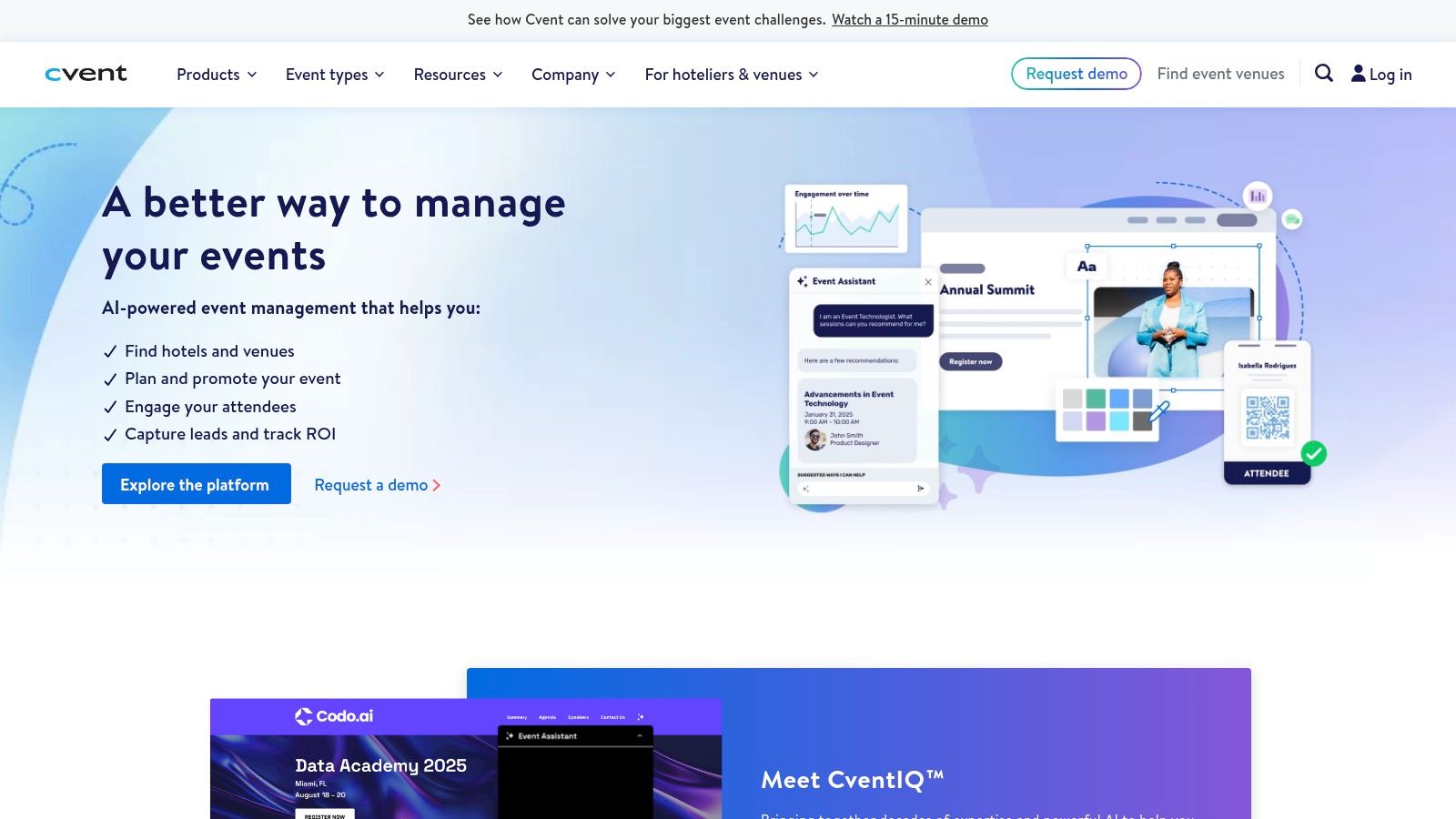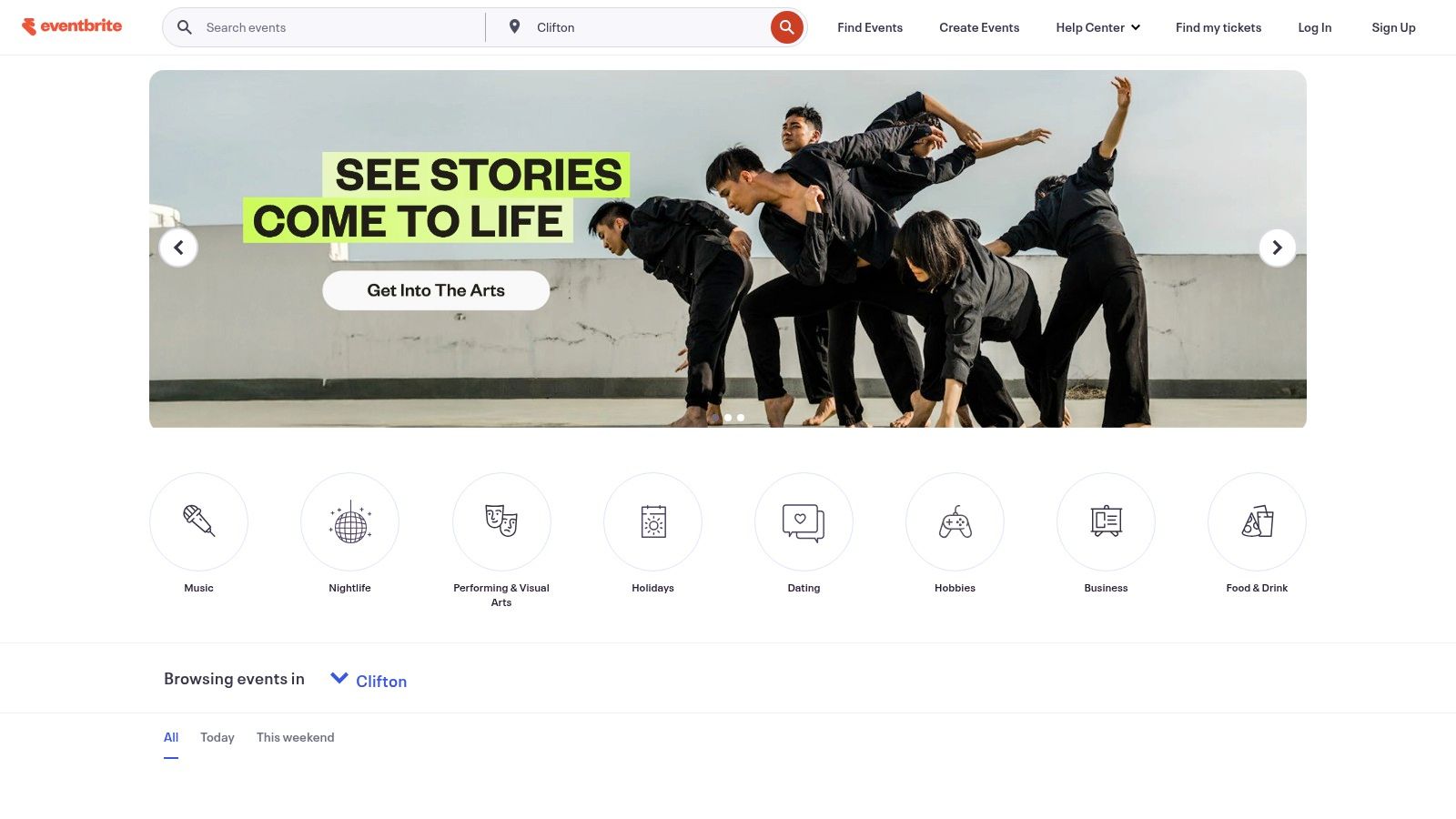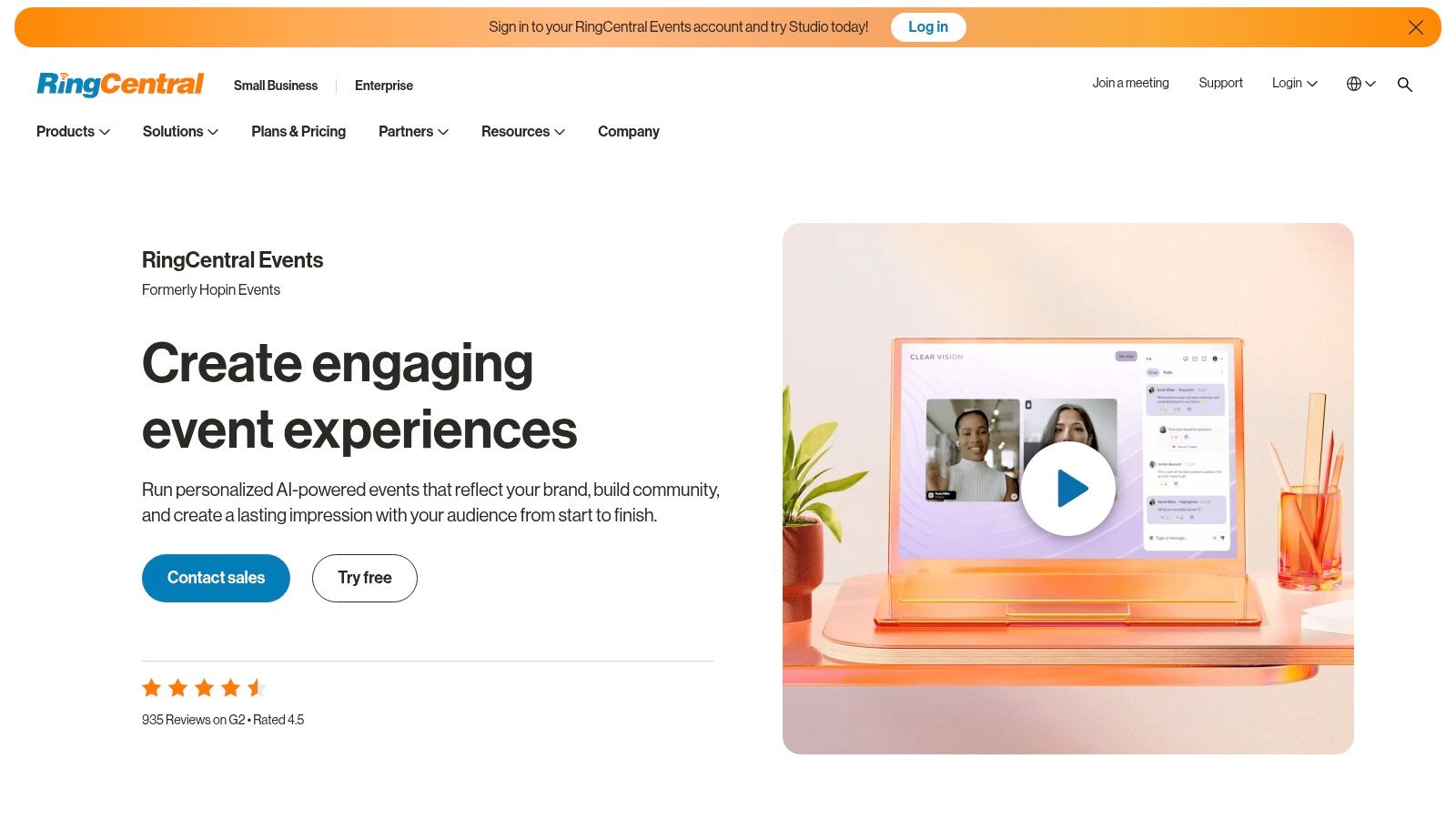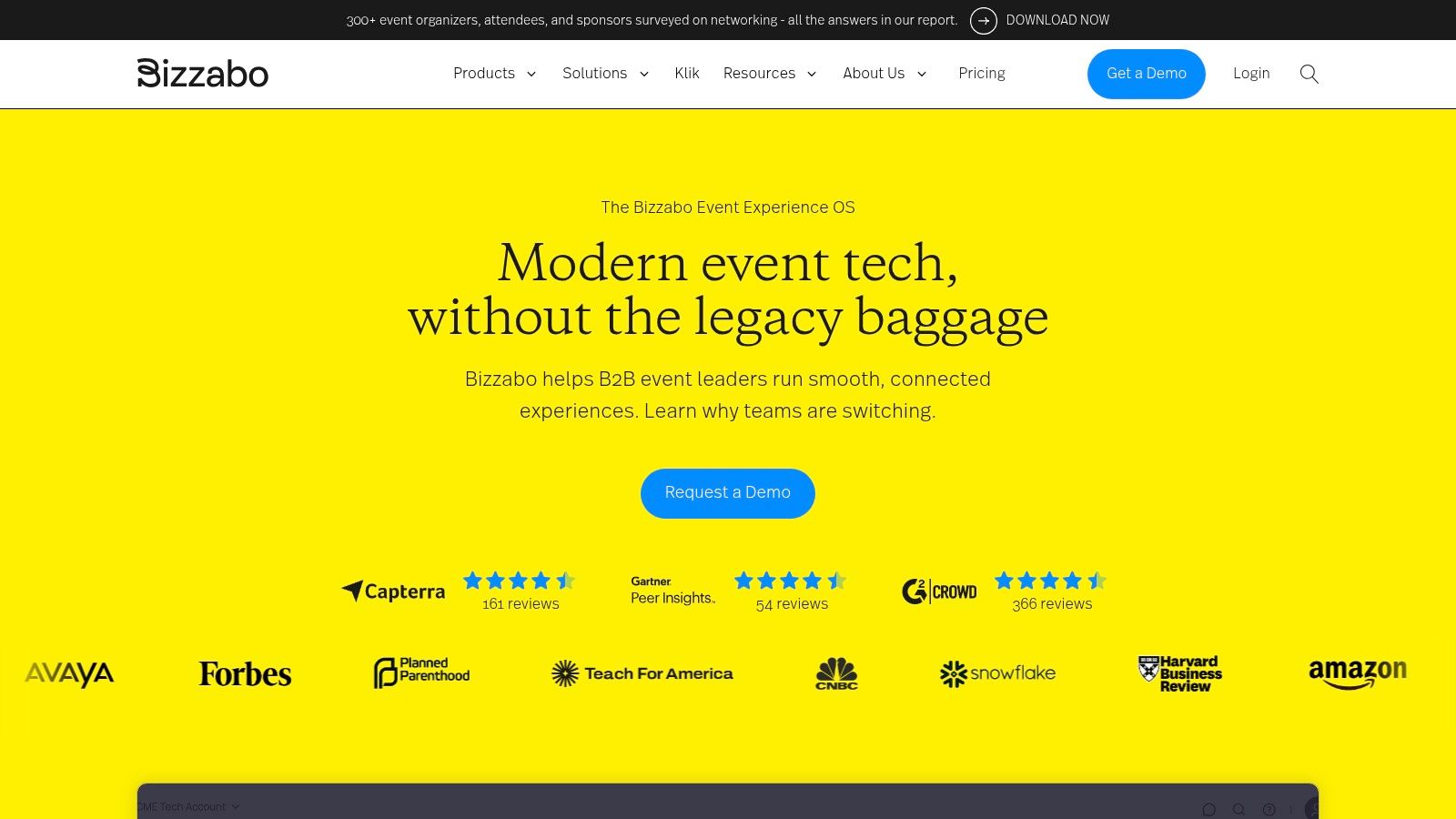August 10, 2025

The success of any event, whether virtual, hybrid, or in-person, hinges on the technology powering it. As attendee expectations evolve, event planners and community managers need tools that go beyond basic registration. They require a comprehensive solution that streamlines every touchpoint, from the initial ticket purchase to post-event engagement and analysis. The right platform doesn't just simplify logistics; it becomes the central nervous system of your entire event strategy, enabling you to deliver unforgettable experiences, prove ROI to stakeholders, and build a thriving community.
However, with a market flooded with options like Cvent, Eventbrite, and GroupOS, identifying the truly indispensable event management software features can be overwhelming. This guide cuts through the noise. We will break down the most critical features that modern organizations must prioritize to drive efficiency, boost engagement, and achieve scalable growth.
This listicle is designed to help you find the best platform for your specific needs. For each feature, we will explain what it does, the business benefits it delivers, and provide screenshots and direct links to see it in action. By understanding these core functionalities, you can make an informed decision and select a tool that elevates your events from mere gatherings to strategic assets.
The gateway to any successful event, whether virtual, hybrid, or in-person, is a frictionless and intelligent ticketing and registration system. This is more than just a payment portal; it's the initial touchpoint in the attendee journey and your first opportunity for critical data collection. Modern event management software features must offer a robust, integrated solution that handles complexity with ease.
This foundational feature transforms a simple sign-up process into a strategic asset. It streamlines revenue, simplifies access control, and provides invaluable data long before the event begins. A powerful registration engine is a non-negotiable component for any serious event planner.
An advanced ticketing and registration system should provide a suite of tools designed to maximize attendance and segment your audience effectively. Look for software that offers dynamic capabilities that directly impact your event's success.
Key Insight: The primary benefit of an integrated system is the reduction of attendee drop-off. A complicated or disjointed registration process is a major source of friction. By keeping everything within one platform, you create a smooth, trustworthy experience that encourages completion and boosts ticket sales.
Imagine a corporate user conference. The event manager can set up tiered ticketing: a standard pass for access to all general sessions, a premium pass that includes an exclusive networking dinner, and a virtual-only pass. Using customizable forms, they can ask registrants which breakout tracks they are most interested in. This data allows the event team to adjust room capacities and inform speakers about anticipated audience interests, ensuring a more relevant and impactful conference for everyone involved.
As a titan in the industry, Cvent offers a comprehensive, end-to-end enterprise platform built for the complexities of professional event planning. It is an ideal solution for those managing large-scale conferences, corporate programs, and trade shows, where robust functionality and data governance are paramount. Cvent’s suite of tools covers the entire event lifecycle, from initial planning and venue sourcing to post-event analytics.

This platform’s strength lies in its ability to consolidate disparate event management tasks into a single, integrated system. By providing tools for registration, marketing, onsite logistics, and reporting, Cvent positions itself as the central command center for complex event portfolios. Its maturity in the market is reflected in its feature depth and scalability.
Cvent's value is most apparent in its deep feature set designed for control and efficiency, making it one of the most powerful event management software features available. It empowers event professionals to manage intricate logistics and prove event ROI with precision.
Key Insight: Cvent excels in environments requiring strict compliance, detailed reporting, and multi-event management. Its greatest advantage is providing a single source of truth for all event data, from initial registration to final ROI analysis, which is critical for large organizations.
Consider a global pharmaceutical company hosting its annual sales kick-off. The event manager uses Cvent to source and book a conference center via the Supplier Network. They then build a complex registration site with different access levels for executives, sales reps, and external partners. Using the integrated email tools, they run a targeted campaign to drive registrations. Onsite, the OnArrival app is used on kiosks for fast check-in and to track session attendance, providing data on which topics were most popular. Post-event, all this data is synced back to their CRM to track the event's influence on the sales pipeline.
As a self-service ticketing and event technology platform, Eventbrite excels at making event creation accessible to a wide audience. It is particularly powerful for organizers of public-facing events like classes, festivals, concerts, and community meetups who need a fast, reliable way to launch and sell tickets. Its key differentiator is the integrated consumer marketplace, which actively promotes events to a vast network of potential attendees.
This platform bridges the gap between simple ticketing and comprehensive event management. For small-to-midsize businesses or solo organizers, Eventbrite provides a robust set of event management software features without the enterprise-level complexity or cost, making it an ideal starting point for growing an event program.

Eventbrite’s strength lies in its user-friendly interface and discoverability engine. The platform is designed to get an event live and selling tickets in minutes, while simultaneously tapping into a built-in audience.
Key Insight: Eventbrite’s core value is its network effect. By listing on the platform, you gain access to a massive, active audience searching for events, reducing your reliance on external marketing spend to drive initial ticket sales and build awareness.
Consider a local culinary school planning a series of weekend cooking classes. Using Eventbrite, the school can quickly create a unique event page for each class, set ticket prices, and establish a cap on attendance. As tickets are sold, the event automatically appears in search results for users in the area interested in "food & drink" events. The school can then use the platform's basic analytics to see which class themes are most popular, helping them plan future offerings and grow their local customer base effectively.
In today's event landscape, the venue is no longer just a physical space. An all-in-one virtual and hybrid venue feature is critical for creating immersive and engaging experiences that cater to both online and in-person attendees. This goes far beyond a simple webinar link; it involves a comprehensive suite of digital tools designed to replicate the energy and interactivity of a live event.
This powerful feature set transforms your event from a passive viewing experience into an interactive digital environment. It unifies disparate event elements like main stages, breakout sessions, and networking lounges into a single, cohesive platform, ensuring a seamless journey for every participant, regardless of their location. An integrated virtual venue is essential for maximizing reach, engagement, and sponsor value in a hybrid world.

A leading virtual venue platform provides dedicated digital spaces for every aspect of your event, creating opportunities for learning, networking, and lead generation. Look for event management software features that offer a robust digital toolkit to elevate the attendee experience.
Key Insight: The main advantage of a comprehensive virtual venue is its ability to foster genuine community and connection. By providing structured yet flexible tools for interaction, from video networking to expo booth chats, you create an environment where attendees can build meaningful relationships, greatly increasing the perceived value of your event.
Consider a global tech company hosting a hybrid user summit. Using a platform with a strong virtual venue, they can stream their main stage keynote live to thousands of virtual attendees. Simultaneously, in-person attendees can use the event app to join breakout sessions, while virtual attendees join the same sessions through the online platform. A virtual expo hall allows sponsors to interact with both audiences, capturing leads from in-person badge scans and virtual booth visits, all synced directly to their Salesforce CRM for immediate sales team access.
Bizzabo positions itself as an Event Experience Operating System, designed for mid-market and enterprise organizations focused on revenue-driven marketing events. It provides a powerful, all-in-one platform that excels at creating immersive attendee experiences and delivering measurable ROI, making it a top contender for complex corporate conferences and trade shows.
This platform unifies virtual, in-person, and hybrid event management into a single data-rich environment. It goes beyond standard registration and ticketing to offer sophisticated tools for engagement, networking, and sponsorship activation, making it one of the most comprehensive event management software features suites available. Bizzabo is built for event teams who view their programs as critical components of their marketing and sales funnels.

Bizzabo's strength lies in its deep integration of engagement technology with robust analytics. This combination empowers organizers to not only execute flawless events but also prove their value through concrete data.
Key Insight: Bizzabo's primary advantage is its focus on connecting event activities directly to business outcomes. By capturing detailed engagement and lead data through features like smart badges and integrating it with CRM systems, it allows marketing leaders to clearly attribute pipeline and revenue to their event investments. For a deeper dive into this, you can learn more about measuring event ROI.
Consider a large-scale tech summit where a key goal is connecting enterprise buyers with solution providers (sponsors). The event manager uses Bizzabo to create detailed sponsor profiles within the event app. Attendees' registration data and in-app activity are used by the matchmaking AI to suggest relevant sponsors to meet. During the event, a sponsor scans an attendee's Klik smart badge to instantly capture their contact details and session history, creating a qualified lead in their CRM. This turns a simple interaction into a trackable, high-value sales opportunity.
For organizations seeking a comprehensive, end-to-end event management platform without the enterprise price tag, Zoho Backstage presents a compelling solution. It’s designed to handle virtual, in-person, and hybrid events with a focus on transparent, budget-friendly pricing, including a functional free tier and commission-free ticketing. This makes it an ideal entry point for small businesses and a powerful tool for larger ones already invested in the Zoho ecosystem.
Zoho Backstage distinguishes itself by bundling essential event management software features into a single, cohesive package. From building a dedicated event website to managing post-event analytics, it provides a unified command center for the entire event lifecycle. Its integration with the wider Zoho suite (like Zoho CRM and Campaigns) creates a seamless data flow, turning event engagement into actionable business intelligence.
Zoho Backstage offers a robust set of tools aimed at streamlining operations and enhancing the attendee experience. Its features are designed to provide professional-grade event management capabilities that are accessible to a broad range of users.
Key Insight: Zoho Backstage’s primary advantage lies in its value proposition. By offering unlimited events under its paid plans and integrating deeply with other Zoho business applications, it eliminates the need for multiple disjointed tools. This creates a single source of truth for event data, from registration to sales follow-up, which is invaluable for proving event ROI.
Consider a growing professional association hosting its annual hybrid conference. Using Zoho Backstage, the event manager can set up a single platform to manage everything. They create a public-facing website with tiered ticketing for in-person and virtual attendees. Sponsors are given access to their dedicated portals to upload logos and company descriptions. During the event, the Backstage mobile app facilitates attendee networking, Q&A sessions, and lead capture for exhibitors. Post-event, all registration and engagement data syncs directly with their Zoho CRM, allowing the marketing team to segment attendees for future membership drives and event promotions.
Before committing to a specific event management software, it's crucial to evaluate the entire market landscape. G2’s dedicated Event Management Software category serves as an indispensable research hub, providing a centralized place to compare solutions, read authentic user reviews, and understand complex feature sets. It’s not a software feature itself, but a meta-tool for making an informed purchasing decision.
Using a platform like G2 empowers event organizers to move beyond vendor marketing and base their choices on real-world user experiences. It helps de-risk the significant investment of time and money involved in adopting a new event tech stack, ensuring the selected software truly aligns with your organization's specific needs.
G2 aggregates and structures vast amounts of user-generated data and vendor information, allowing for efficient and targeted research. This platform streamlines the vendor evaluation process, which is a critical, yet often time-consuming, part of implementing new event management software features.
Key Insight: The primary benefit of using a review aggregator like G2 is the reduction of selection risk. By leveraging the collective intelligence of hundreds of fellow event professionals, you can validate a vendor's claims and avoid costly mismatches between your needs and a platform's actual capabilities.
Imagine an association event manager is tasked with finding a new platform that excels at both virtual event engagement and membership integration. Using G2, they can filter the Event Management category for platforms with high ratings in "Virtual Event Features" and "Audience Engagement." They can then read reviews specifically from users in the "Non-Profit" sector to see how well the software handles member-only pricing and data synchronization. This focused approach allows them to create a highly qualified shortlist of 3-4 vendors for demos in a fraction of the time it would take to research each one individually.
The event landscape has fundamentally evolved. It's no longer just about filling seats or booking venues; it's about architecting dynamic, data-driven experiences that build lasting communities and deliver measurable business value. Throughout this guide, we've explored the critical event management software features that form the foundation of a modern, resilient event strategy. From integrated ticketing and registration systems to robust analytics dashboards and engaging mobile event apps, each feature represents a crucial tool in your arsenal.
The key takeaway is this: individual features, while powerful, achieve their maximum potential when they work together within a cohesive ecosystem. Platforms like Cvent and Bizzabo demonstrate the power of all-in-one solutions, while tools like RingCentral Events highlight the specific needs of virtual and hybrid formats. Your goal should be to move beyond piecemeal solutions and adopt a platform that unifies your event operations, marketing, and community engagement efforts.
As you evaluate your options, resist the temptation to simply check boxes on a feature list. Instead, frame your decision-making process around your core business objectives. The most effective approach is to translate your strategic goals into required functionalities.
Choosing the right software is a strategic investment in the future of your events program. As you narrow down your choices using resources like the G2 Event Management Software category, consider the total cost of ownership, the quality of customer support, and the platform's scalability. Will the software grow with you as you expand from small webinars to large-scale hybrid conferences? Does it support the entire event lifecycle, from pre-event marketing to post-event community nurturing?
Ultimately, the most powerful event management software features are those that empower you to not just manage logistics, but to create connections, capture data, and cultivate a thriving community that delivers value long after the final session has ended. By making a strategic choice today, you are laying the groundwork for more successful, impactful, and profitable events for years to come.
Ready to see how these essential features come together in a single, community-focused platform? GroupOS provides an integrated suite of tools designed to manage your events and grow your community in one place. Explore GroupOS to discover how you can streamline your event workflow and build a more engaged audience.


